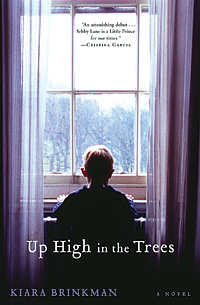Up High in the Trees by Kiara Brinkman ’01 (Grove/Atlantic).
Up High in the Trees, by Kiara Brinkman, is a debut novel of exquisite, resonating moments strung together by the voice of its impressively imagined eight-year-old narrator.
At the start it’s been five months since Sebby Lane’s mother was hit and killed by a car while out running one night. Sebby lives in Massachusetts with his music-professor father and an older brother and sister. Sebby also has Asperger’s syndrome. His clothes have to be piled correctly or he won’t put them on; he sometimes thinks in lists; and people are always calling out “Earth to Sebby.”
In lyrical snapshot chapters, some less than half a page long, the story flickers between Sebby’s rich memories of his mom and the dark motherless present, where the family tries to cling to routines and find a path through the space left by her death.
This of course doesn’t work, and as Sebby’s frustration escalates he can no longer contain it by merely hiding under the sink. He bites a classmate and has to leave school. Sebby’s father decides that the older children will be fine at home and takes Sebby to live at the family’s ocean-side summerhouse. But once there, the father slides into his own even wider depression, leaving Sebby more or less on his own to swim through memories and try to patch together all that has happened to him.
But Sebby turns out to be surprisingly resilient. And eventually, through letters to a teacher at home and a friendship with two neighboring children, he finds his way.
In less sure hands this story could quickly slide into a sentimental sinkhole. But here that doesn’t happen, mainly because of the spare, ringing sound of Sebby’s voice. To Sebby the books in the library smell “peppery,” and a hiding spot in the closet has “the cold-air smell of winter coats.” To a reader it feels like entering an unfamiliar room and then seeing the world outside through a very different window. Which in the end makes this much less a book about a narrator with Asperger’s and more about perception and memory and the arc of grief. It’s a haunting accomplishment.
Ed Hardy teaches nonfiction writing at Brown. His most recent novel is Keeper and Kid.





